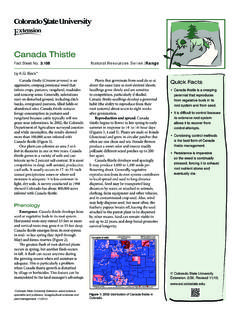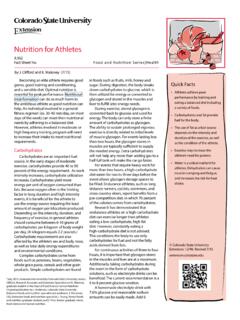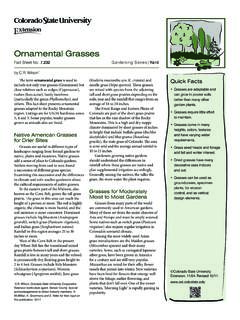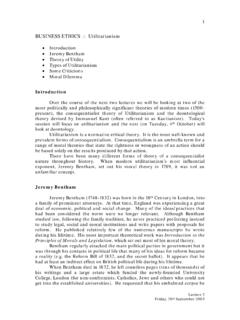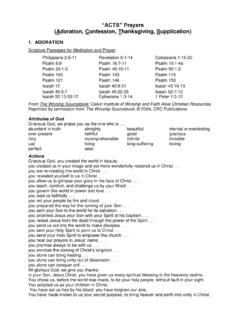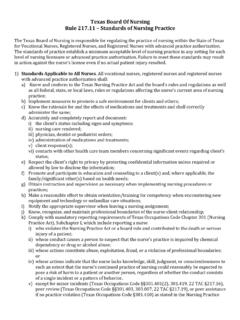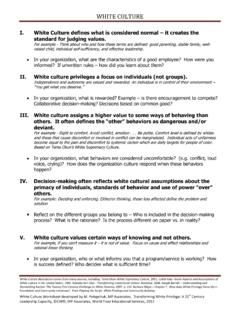Transcription of Nutrition for Athletes - Extension
1 Fact Sheet No. Food and Nutrition Series|Healthby J. Clifford and K. Maloney (7/15)Becoming an elite athlete requires good genes, good training and conditioning, and a sensible diet. Optimal Nutrition is essential for peak performance. Nutritional misinformation can do as much harm to the ambitious athlete as good Nutrition can help. An individual involved in a general fitness regimen (ex. 30-40 min/day, on most days of the week) can meet their nutritional needs by adhering to a balanced diet. However, Athletes involved in moderate or high frequency training program will need to increase their intake to meet nutritional requirements. CarbohydratesCarbohydrates are an important fuel source. In the early stages of moderate exercise, carbohydrates provide 40 to 50 percent of the energy requirement. As work intensity increases, carbohydrate utilization increases. Carbohydrates yield more energy per unit of oxygen consumed than fats.
2 Because oxygen often is the limiting factor in long duration and high intensity events, it is beneficial for the athlete to use the energy source requiring the least amount of oxygen per kilocalorie produced. Depending on the intensity, duration, and frequency of exercise, in general Athletes should consume between 6-10 grams of carbohydrates per kilogram of body weight per day. (A kilogram equals pounds.) Carbohydrate requirements are also affected by the athlete s sex and body mass, as well as total daily energy expenditures and environmental carbohydrates come from foods such as potatoes, beans, vegetables, whole grain pasta, cereals and other grain products. Simple carbohydrates are found Quick Facts Athletes achieve peak performance by training and eating a balanced diet including a variety of foods. Carbohydrates and fat provide fuel for the body. The use of fat as a fuel source depends on the intensity and duration of the exercise, as well as the condition of the athlete.
3 Exercise may increase the athlete s need for protein. Water is a critical nutrient for Athletes . Dehydration can cause muscle cramping and fatigue, and increases the risk for heat stroke. Nutrition for Colorado State University Extension . 12/96. Revised 7 foods such as fruits, milk, honey and sugar. During digestion, the body breaks down carbohydrates to glucose, which is then utilized for energy or converted to glycogen and stored in the muscles and liver to fulfill later energy exercise, stored glycogen is converted back to glucose and used for energy. The body can only store a finite amount of carbohydrates as glycogen. The ability to sustain prolonged vigorous exercise is directly related to initial levels of muscle glycogen. For events lasting less than two hours, the glycogen stores in muscles are typically sufficient to supply the needed energy. Extra carbohydrates will not help any more than adding gas to a half-full tank will make the car go events that require heavy work for more than two hours, a high-carbohydrate diet eaten for two to three days before the event allows glycogen storage spaces to be filled.
4 Endurance Athletes , such as long distance runners, cyclists, swimmers, and cross-country skiers, report benefits from a pre-competition diet, in which 70 percent of the calories comes from has demonstrated that endurance Athletes on a high-carbohydrate diet can exercise longer than Athletes eating a low-carbohydrate, high-fat diet. However, constantly eating a high-carbohydrate diet is not advised. This conditions the body to use only carbohydrates for fuel and not the fatty acids derived from continuous activities of three to four hours, it is important that glycogen stores in the muscles and liver are at a maximum. Additionally, taking carbohydrates during the event in the form of carbohydrate solutions, such as electrolyte drinks can be beneficial. The current recommendation is a 6 to 8 percent glucose homemade electrolyte drink with glucose and reasonable sodium amounts can be easily made.
5 Add 6 *July, 2015, reviewed and revised by Colorado State University Jessica Clifford, Research Associate and Extension Specialist and K. Maloney, graduate student in the Dept of Food Science Human Nutrition . Original publication by J. Anderson, Colorado State University Extension foods and Nutrition specialist and professor; S. Perryman, CSU Extension foods and Nutrition specialist; L. Young, former foods and Nutrition graduate student; and S. Prior, former graduate intern, food science and human sugar and 1/3 teaspoon salt to each quart of water. Dissolve sugar and cool. The salt translates into a sodium concentration of 650 mg/liter. Sports drinks can be used to supply sodium and glucose if the athlete tolerates them, but other electrolytes are not essential until after the event. Athletes should experiment during training to find if electrolyte beverages are right for sugar or honey just before an event does not provide any extra energy for the event.
6 It takes approximately 30 minutes for the sugar to enter the blood stream. This practice may also lead to dehydration. Water is needed to absorb the sugar into the cells. Furthermore, sugar eaten before an event may hinder performance because it triggers a surge of insulin. The insulin causes a sharp drop in blood sugar level after about 30 minutes. Competing when the blood sugar level is low leads to fatigue, nausea and diet in which 70 % of calories come from carbohydrates, eaten for three days prior to the event, is sometimes helpful for endurance Athletes . (See Table 1 for a sample menu.) However, water retention often is associated with carbohydrate loading, or the practice of eating large amounts of carbohydrates. This may cause stiffness in the muscles and sluggishness early in the event. Sticking to a three-day regimen minimizes this effect. FatsFat is also a significant contributor to energy needs.
7 It supplies 9 kcal/g of fat, making it the most energy dense macronutrient. During ultra-endurance events, lasting 6-10 hours, fat can contribute 60-70% of energy requirements. Using fat as fuel depends on the event s duration and the athlete s condition. As duration increases and/or intensity decreases, the utilization of fat as an energy source increases. For moderate exercise, about half of the total energy expenditure is derived from free fatty acid metabolism. If the event lasts more than an hour, the body may use mostly fats for energy. Furthermore, trained Athletes use fat for energy more quickly than untrained Athletes . Fat consumption should be a minimum of 20 percent of total energy intake to preserve athletic performance. Maintaining adequate fat intake is crucial to meeting nutritional needs of essential fatty acids and fat-soluble vitamins, vitamins A, D, E and K.
8 Athletes who are under pressure to achieve or maintain a low body weight are susceptible to using fat restriction and should be told that this may hinder their performance. While adequate fat intake is necessary, claims that suggest a high-fat low-carbohydrate diet enhances athletic performance have not been supported by research. ProteinWhen compared to fat and carbohydrates, protein contributes minimally to energy needs for the body. Dietary protein is digested into amino acids, which are used as the building blocks for the different tissues, enzymes, and hormones that the body needs to function. It is important for muscle building and repair that occurs after exercise. Exercise may increase an athlete s need for protein, depending on the type and frequency of exercise. The current Recommended Daily Allowance (RDA) for protein is grams per kilogram per day. However, the Academy for Nutrition and Dietetics and the American College of Sports Medicine recommend that endurance Athletes eat between grams of protein per kg of body weight per day and resistance and strength-trained Athletes eat as much as grams protein per kg of body weight.
9 Eating protein after an athletic event has been shown to support muscle protein synthesis. However, eating protein in excess of nutritional needs has not been shown to further increase muscle building. Extra protein is broken down for energy or is stored as 1: Sample menu of a high carbohydrate item Calories Grams carbohydrateBreakfast8 ounces orange juice 134 331 cup blueberries 83 211 medium banana 105 278 ounces low-fat vanilla yogurt 240 412/3 cup LEP Cranberry Pecan Granola 443 58 Lunch2 cups (cooked) whole wheat pasta 347 744 ounces skinless chicken breast 187 0 cup marinara sauce 80 102 ounces saut ed onions 33 6 cup saut ed mushrooms 14 22 ounces saut ed zucchini 33 31 tablespoon parmesan cheese 21 01 whole wheat dinner roll 76 158 ounces grape juice 150 37 Dinner3 ounces grilled cod 89 01 baked yam 174 411 cup (cooked)
10 Brown rice 216 451 cup spinach 7 1 cup carrot 25 6 cup croutons 31 65 cherry tomatoes 15 38 ounces non-fat milk 83 128 ounces apple juice 114 28 Snack4 ounces of raisin 339 9010 whole wheat crackers 171 28 LEP Balsamic Grilled Peach 112 19 TOTAL 3323 606 (73% of total calories)A varied diet should provide more than enough protein as caloric intake increases. However, vegetarian Athletes should work with a dietitian to make sure their protein intake is sufficient. Excess protein can deprive the athlete of more efficient fuel sources and can lead to dehydration. High-protein diets increase the water requirement necessary to eliminate the nitrogen through the urine. Also, an increase in metabolic rate can occur and, therefore, increased oxygen consumption. Protein and amino acid supplements are unnecessary and not recommended.
